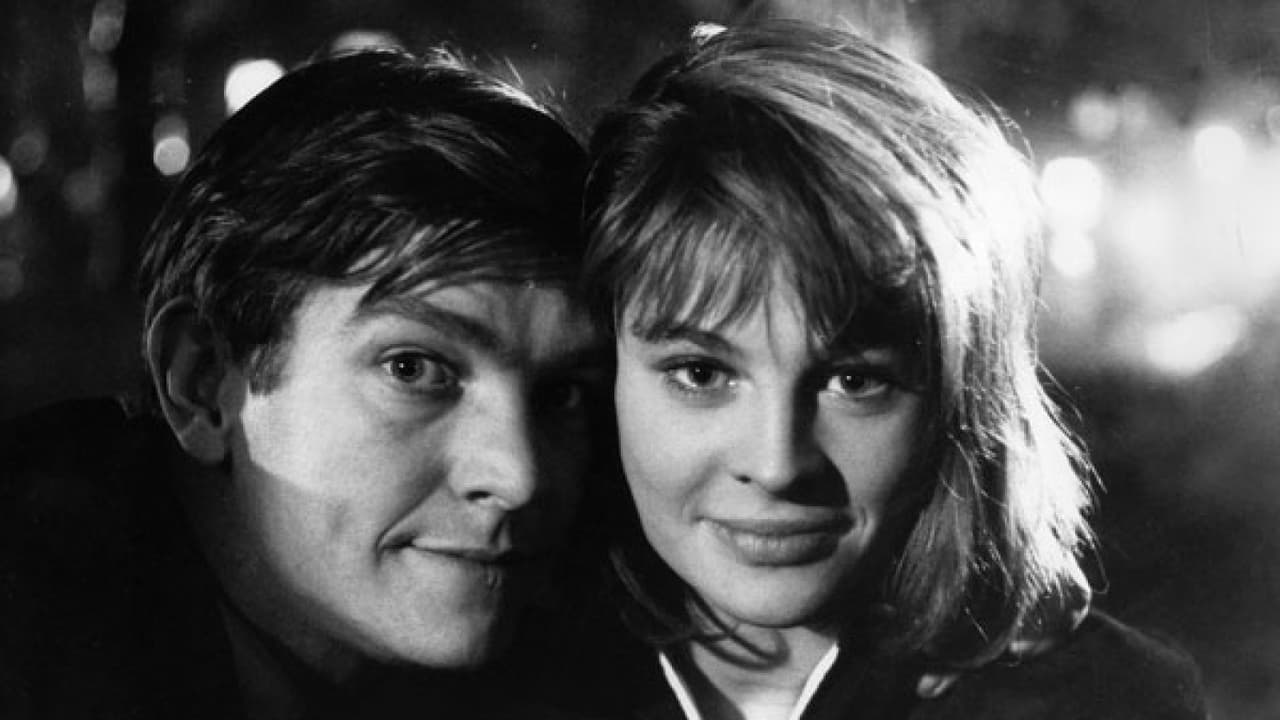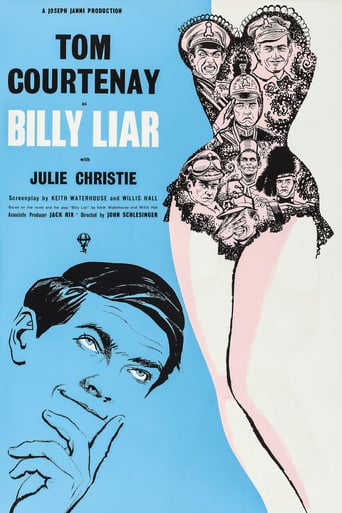

Wow! Such a good movie.
... View MoreThis Movie Can Only Be Described With One Word.
... View MoreJust perfect...
... View MoreActress is magnificent and exudes a hypnotic screen presence in this affecting drama.
... View MoreBilly Liar was awful. It was uninteresting and about nothing.An annoying character making up silly fantasies in his head, no thanks. Turned it off, which is rare for me I will usually just endure it.
... View MoreHaving seen Albert Finney on stage I didn't feel that Tom Courtney was as strong in the lead role for the film but in many ways this suits the part. No point in making the daydreaming loser too strong in personality, although the anomaly here is that he seems to have no difficulty attracting the ladies even if he is a bit soppy. Never as funny as the book, Schlesinger opens up the film and those facial gestures from the stage and subtle asides in the book are lost. As a movie capturing the times that were very much about to change it is brilliant. I loved the opening credits with the rows of semi-detached houses (because we are talking poor middle class here, not working class) and the shots of slum clearance. The tone is apt too and very theme, so central here, of 'going down to London' so much of the time just a few years before those swing sixties would burst everything apart. One last point, should anyone be wary of bothering with a British 'kitchen sink' drama, there is an early and completely incandescent performance from Julie Christie. She glows on screen and is particularly noticeable with the surrounding drabness and the usual stereotypical British girls on show. A sensational performance that set Christie up fora very decent career and parts in some very influential and important films, not least her next with the same director - Darling.
... View MoreTom Courtenay stars as Billy, an unhappy clerk who still lives at home with his impatient family. To escape the drudgery of his life, Billy passes the time telling outrageous lies and fantasizing about his very own country where he is the beloved ruler and war hero.I must admit I didn't know this movie was considered a comedy until I read some reviews. While the fantasy sequences are certainly amusing, Billy's day-to-day existence is lonely, unfulfilling, and depressing. I found Tom Courtenay to be adequate but dull and unsympathetic. On the other hand, Julie Christie is remarkably confident, mature, and charismatic and the screen really lights up during her few scenes. The black and white movie was one of the first in the sixties to feature the working class in all it's gritty glory. (I wish the DVD had had subtitles to help me with the thick north-of-England accents.) The movie is similar to Danny Kaye's The Secret Life of Walter Mitty, but the humor is much more subtle. I thought the dramatic scenes lacked heart-felt pathos and I never liked or felt sorry for Billy. Watch it for its place in British film history and for the screen debut of the lovely Miss Christie.
... View MoreBilly has imagination, but can't direct it. He sort of wants to direct it by getting a script writing job with a second-rate entertainer. But he doesn't think beyond that possibility once he's refused. So he falls back into his usual private reveries, which are unfailingly about personal power because in real life, he has none. So he dreams of commanding armies liberating countries, and machine-gunning those who bore him, when in fact he works as a clerk in an undertaking parlor. In short, he's a rather weak-- but not untalented-- soul trapped by a lower middle-class existence in a small industrial town, where his imaginative social side makes him prone to making up lies.It's this rather vague struggle between individual potential and social circumstance that drives the movie. If Billy were a stronger personality-- say, a Richard Burton-- the film would take on a very different complexion. But he's not, so he muddles along from one predicament to the next, vaguely dissatisfied with life but not knowing what to do about it. That's epitomized in the appropriately located graveyard scene with his "fiancee", the pathetically trusting Barbara. She wants nothing more than a modest married existence, and be thankful for that. Billy, however, can't think beyond the lies he tells her and his other "fiancee", the tough-talking Rita. So, he leads them both on. At some level, Billy understands that what was good enough for his father or Barbara or Rita, is not good enough for him. But then, his dad, as the script implies, lived through a different era when a man gladly traded luxuries like imagination for the settled guarantees of family and a job. Thus, in Dad's eyes Billy is simply ungrateful; whereas for Billy, Dad is dull and oppressive.Now, I'm not a cultural historian, but it seems Billy and Liz (Julie Christie) are transitional figures between the ravages of the Depression and war years of the 30's and 40's and the liberating potentials of the 1960's. It's clearly so in Liz's case. Watch her spirited passage through the downtown, past the stores and traffic she so winningly subdues. She's clearly a free-spirit in the making, a prophet of that "swinging London" soon to come. Here, the screenplay is especially sensitive to emerging trends. Note how quickly she "gives herself" to the conflicted Billy once she believes a rapport has been established. Thus the pathway to larger liberation, her character implies, lies through a loosening of sexual repression. Thus a meaningful contrast with the conventionally repressed Barbara is established.But whereas Liz makes an effortless leap to London, Billy either does not or cannot. It's not clear which, and that's probably just as well. Is he really responding to family duty or is he simply too weak to finally commit himself to a big-city life that may overwhelm his comfortable little fantasies. All in all, it's an interesting movie, very well acted with significant themes. My only real complaint is the last scene from the street following Billy's return. There's a light on in his little second-floor room-- logically, shouldn't it go out?
... View More